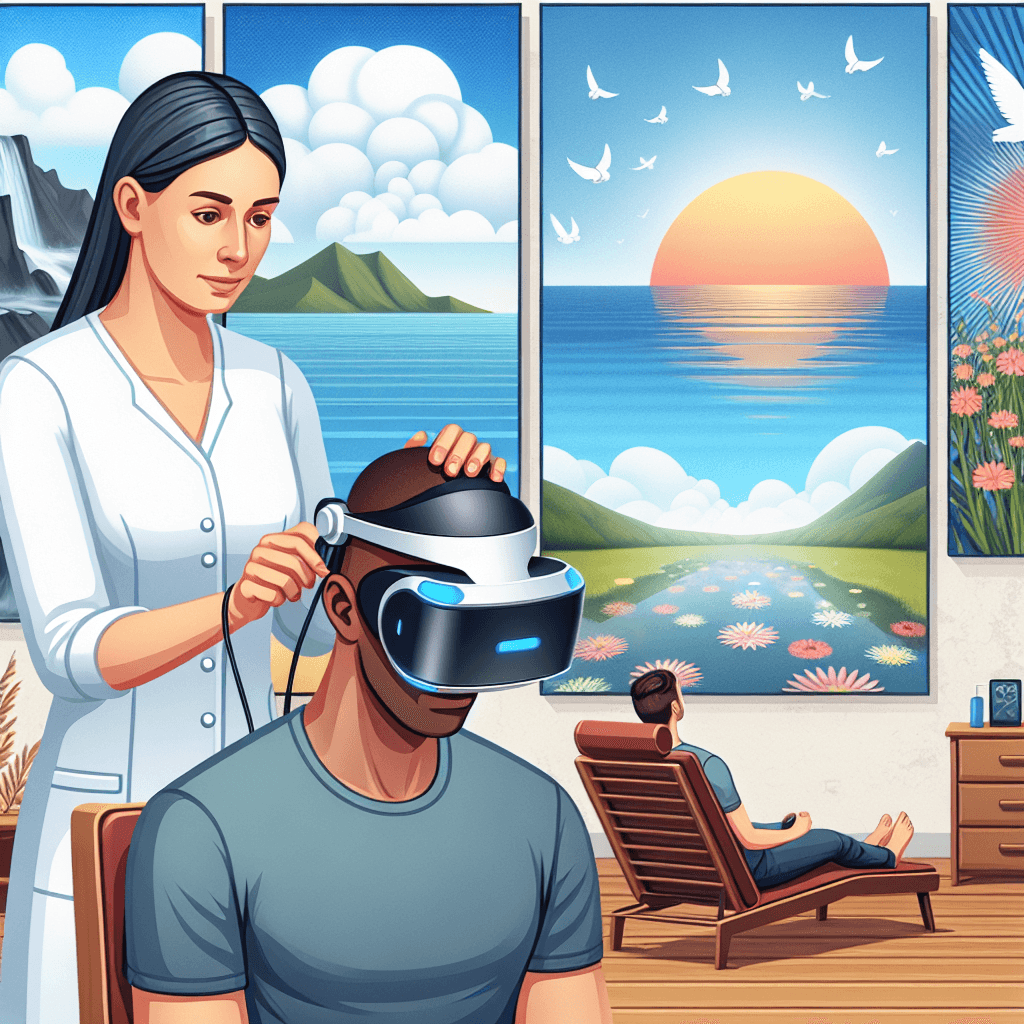In today’s modern world, advancements in technology continue to revolutionize various industries, including mental health therapy. Virtual Reality (VR) has emerged as a powerful tool that offers unique opportunities for therapeutic intervention. This article explores the potential of VR in shaping the future of mental health therapy, discussing its benefits, applications, and the impact it can have on improving the overall well-being of individuals dealing with mental health challenges.

Table of Contents
Understanding Virtual Reality
Virtual Reality (VR) refers to a computer-generated simulation in which individuals can interact with a three-dimensional environment using electronic devices, such as headsets and gloves. This immersive technology replicates real or imagined experiences, stimulating multiple senses, including sight, sound, and touch. As an innovative tool in various fields, VR has gained significant attention for its potential to enhance mental health therapy.
Definition of Virtual Reality
Virtual Reality can be defined as a technology that creates computer-generated environments, allowing users to experience and interact with them as if they were real. Through the use of head-mounted displays, motion sensors, and haptic devices, individuals can enter a virtual world and engage with the elements within it. This technology not only provides a visually captivating experience but also creates a sense of presence, immersing the user in a digitally simulated environment.
Applications of Virtual Reality in Other Fields
While VR is commonly associated with gaming and entertainment, its potential extends far beyond these industries. Various fields have recognized the value of VR and have integrated it into their practices. In healthcare, for example, VR has been used for surgical training, pain management, and physical rehabilitation. In education, VR has revolutionized experiential learning by enabling students to explore historical sites and engage in realistic simulations. The use of VR in architecture and engineering has allowed designers to visualize and test their creations before construction begins. These applications showcase the versatility and transformative power of VR technology.
Current Challenges in Mental Health Therapy
Mental health therapy faces several challenges that hinder its accessibility and effectiveness. These challenges include limited access to treatment, the stigma associated with mental health, and the lack of personalization and engagement in traditional therapy approaches.
Limited Access to Treatment
Access to mental health therapy is often restricted by geographical and financial barriers. Many individuals residing in remote areas or resource-limited regions find it difficult to access adequate mental health services. Additionally, the cost of therapy sessions can be prohibitive for some individuals, preventing them from seeking the help they need.
Stigma Associated with Mental Health
Stigma remains a significant obstacle in mental health therapy. Many individuals hesitate to seek treatment due to the fear of being judged or labeled as “mentally ill”. The negative perceptions associated with mental health conditions can lead to self-stigmatization, isolation, and a reluctance to discuss symptoms openly. This stigma contributes to a lower utilization of mental health services and delays in seeking help.
Lack of Personalization and Engagement
Traditional therapy approaches may not always cater to the individual needs and preferences of patients. Some individuals may find it challenging to engage with the therapeutic process, leading to limited progress in their recovery. The lack of personalization and engagement can hinder the effectiveness of therapy and discourage individuals from continuing their treatment.

Virtual Reality Advancements in Mental Health Therapy
Virtual Reality has emerged as a promising tool in mental health therapy, offering new possibilities for treatment and intervention. The advancements in VR technology have paved the way for the development of various therapeutic applications, including Virtual Reality Exposure Therapy (VRET) and Virtual Reality Cognitive Behavioral Therapy (VR-CBT).
Overview of Virtual Reality Therapy
Virtual Reality Therapy encompasses a range of therapeutic techniques that utilize VR technology to deliver interventions. It allows therapists to create immersive and interactive environments that simulate real-life scenarios or imagined situations. By exposing patients to these virtual environments, therapists can address specific fears, anxieties, or traumatic experiences. The immersive nature of VR therapy enhances the therapeutic process by engaging multiple senses and evoking emotional responses.
Virtual Reality Exposure Therapy
Virtual Reality Exposure Therapy (VRET) is a form of therapy that uses VR technology to simulate real-life situations that trigger anxiety or fear. It is particularly effective in treating phobias, post-traumatic stress disorder (PTSD), and anxiety disorders. By gradually exposing patients to the fear-inducing stimuli in a controlled virtual environment, therapists can help patients confront and manage their fears. VRET provides a safe and controlled setting for exposure, allowing patients to gradually build resilience and develop coping strategies.
Virtual Reality Cognitive Behavioral Therapy
Virtual Reality Cognitive Behavioral Therapy (VR-CBT) combines the principles of cognitive-behavioral therapy (CBT) with VR technology. It aims to modify maladaptive thoughts, beliefs, and behaviors by immersing patients in virtual scenarios that reflect their specific challenges. VR-CBT allows therapists to recreate real-life situations that trigger negative thoughts or behaviors, providing a realistic and controlled environment for patients to practice coping strategies and cognitive reframing techniques. This immersive approach enhances the effectiveness of CBT by allowing patients to experience and address their problems directly.
Benefits of Virtual Reality Therapy
The integration of Virtual Reality into mental health therapy has brought about several benefits that address the current challenges in the field. These benefits include improved access to treatment, reduced stigma and privacy concerns, and enhanced personalization and engagement.
Improved Access to Treatment
One of the key advantages of Virtual Reality Therapy is its potential to overcome geographical and financial barriers. With the ability to deliver therapy remotely, VR therapy eliminates the need for patients to travel long distances or book appointments within specific timeframes. This feature allows individuals in remote or underserved areas to access mental health services conveniently and receive timely treatment. Additionally, VR therapy can be cost-effective compared to traditional in-person therapy, making it more accessible to a wider range of individuals.
Reduced Stigma and Privacy Concerns
Virtual Reality Therapy offers a sense of anonymity and privacy that can alleviate the stigma associated with mental health conditions. Patients can receive therapy discreetly from their own homes, reducing the fear of being judged or identified by others. This privacy enables individuals to seek therapy without the concern of information being disclosed to anyone else. The confidential nature of VR therapy promotes a safe and non-judgmental environment, encouraging individuals to seek help and actively participate in their treatment.
Enhanced Personalization and Engagement
Traditional therapy approaches may not always cater to the individual needs and preferences of patients. With Virtual Reality Therapy, therapists can create customized experiences that address each patient’s specific challenges. By tailoring virtual scenarios to individual needs, therapists can provide personalized interventions that target the unique aspects of a patient’s condition. Moreover, the immersive and interactive nature of VR therapy captures and sustains patients’ attention, enhancing their engagement in the therapeutic process. This heightened engagement allows for more effective treatment outcomes and a greater sense of empowerment for the patient.

Effectiveness and Evidence-based Research
The effectiveness of Virtual Reality Therapy has been supported by a growing body of evidence-based research. Studies comparing VR therapy to traditional therapeutic approaches have highlighted its potential to improve treatment outcomes and enhance patient experiences.
Research Findings on Virtual Reality Therapy
Research findings have demonstrated the efficacy of Virtual Reality Therapy across various mental health conditions. For instance, studies have shown that VRET is effective in reducing symptoms of specific phobias, such as fear of flying or height. In the treatment of PTSD, VR therapy has been found to reduce symptoms and improve emotional functioning. VR-CBT has also yielded positive results in addressing social anxiety and other anxiety disorders. The immersive and interactive nature of VR therapy allows patients to engage more deeply in the therapeutic process, leading to more effective outcomes compared to traditional therapy approaches.
Comparisons to Traditional Therapeutic Approaches
When compared to traditional therapeutic approaches, Virtual Reality Therapy has shown promising advantages. Studies have indicated that VR therapy produces comparable or superior outcomes compared to traditional exposure therapy for specific phobias and PTSD. In addition, VR therapy has been found to be as effective as in-person CBT for the treatment of anxiety disorders and social anxiety. The immersive nature of VR therapy enables patients to confront and manage their fears in a safe and controlled environment, facilitating the therapeutic process and improving treatment outcomes.
Integration of Virtual Reality in Clinical Settings
The integration of Virtual Reality Therapy into clinical settings comes with several challenges and considerations. These include implementation challenges, training mental health professionals, and the acquisition of virtual reality equipment and technical requirements.
Implementation Challenges
The implementation of Virtual Reality Therapy in clinical settings requires careful planning and consideration of logistical issues. Infrastructure, such as reliable internet connections and appropriate physical spaces, needs to be in place to support the delivery of VR therapy. Additionally, integrating VR therapy into existing treatment protocols and workflows may require adjustments and coordination among healthcare professionals. Addressing these implementation challenges ensures the smooth integration of VR therapy into clinical settings, promoting its successful utilization.
Training Mental Health Professionals
Proper training of mental health professionals is essential for the effective implementation of Virtual Reality Therapy. Therapists need to develop the necessary skills to navigate VR technology, create therapeutic scenarios, and guide patients through VR experiences. Training programs can equip mental health professionals with the knowledge and competence to effectively utilize VR therapy as part of their therapeutic toolkit. Ongoing professional development and certification programs can keep therapists up-to-date with advancements in VR technology and best practices in VR therapy.
Virtual Reality Equipment and Technical Requirements
Virtual Reality Therapy relies on the availability of appropriate equipment and technical infrastructure. Head-mounted displays, motion sensors, and haptic devices are essential components of VR therapy delivery. Acquiring and maintaining these devices, as well as ensuring software compatibility, can pose financial and logistical challenges. Additionally, technical support and troubleshooting mechanisms need to be in place to address any technical issues that may arise during therapy sessions. The availability of reliable and up-to-date equipment ensures a seamless VR therapy experience for both therapists and patients.

Ethical Considerations in Virtual Reality Therapy
The integration of Virtual Reality Therapy raises important ethical considerations that need to be addressed to ensure the well-being and safety of patients.
Privacy and Data Security
Virtual Reality Therapy involves the collection and processing of personal data. Ensuring patient privacy and data security is of utmost importance to maintain trust and confidentiality. Data breaches, unauthorized access to patient information, and potential misuse of collected data need to be safeguarded against. Implementing robust data protection measures and adhering to ethical guidelines can prevent privacy breaches and ensure the ethical use of patient data in VR therapy.
Informed Consent and Patient Autonomy
Obtaining informed consent from patients before engaging in Virtual Reality Therapy is crucial. The immersive nature of VR therapy may evoke intense emotional and psychological responses, requiring patients to be fully informed of the potential risks and benefits. Patients should be provided with comprehensive information about the therapy process, including its limitations and potential side effects. Respecting patient autonomy and ensuring their ability to make informed decisions regarding their treatment is essential in VR therapy.
Potential for Escapism and Dependency
VR therapy has the potential to create immersive and captivating experiences that may lead to escapism and dependency. Patients may develop a preference for virtual experiences, potentially withdrawing from real-world interactions and responsibilities. Mental health professionals need to be vigilant in monitoring patient well-being during and after VR therapy sessions. Setting appropriate boundaries and incorporating real-life coping strategies and social connections into therapy can mitigate the risk of excessive reliance on virtual environments.
Future Implications and Possibilities
The future of Virtual Reality Therapy holds immense potential for further advancement and integration in mental health treatment.
Expansion of Virtual Reality Applications
As VR technology continues to evolve, the potential applications in mental health therapy are likely to expand. VR therapy may be utilized in the treatment of a wider range of mental health conditions, such as depression, addiction, and eating disorders. The versatility of VR technology allows for the creation of tailored interventions that address the specific needs of various patient populations.
Integration with Artificial Intelligence and Machine Learning
The integration of Virtual Reality Therapy with artificial intelligence and machine learning has the potential to enhance treatment personalization and effectiveness. By analyzing patient data collected during VR therapy sessions, AI algorithms can provide insights and recommendations to therapists. This integration can help mental health professionals refine treatment plans, monitor patient progress, and predict personalized treatment outcomes.
Collaboration with Other Therapeutic Approaches
Virtual Reality Therapy can be integrated with other therapeutic approaches to achieve synergistic effects. Combining VR therapy with traditional therapies, such as medication management or group therapy, can create a comprehensive and holistic treatment approach. The integration of different therapeutic modalities enables mental health professionals to tailor treatment plans that address the multifaceted nature of mental health conditions.

Limitations and Potential Risks
While Virtual Reality Therapy holds promise for advancing mental health treatment, it is essential to consider the limitations and potential risks associated with its implementation.
Cost and Accessibility
The cost of VR equipment and technical requirements may limit the widespread adoption of Virtual Reality Therapy. VR headsets and related devices can be expensive, making them inaccessible to individuals with limited financial resources. Additionally, the availability of VR therapy may be limited to certain healthcare settings or regions, leaving some individuals without access to this innovative form of therapy.
Inadequate Research and Long-term Effects
Although research on Virtual Reality Therapy has shown promise, there is a need for additional studies to evaluate long-term effects and sustainability. Further research is required to determine the optimal duration and frequency of VR therapy sessions, as well as its efficacy in different patient populations. Long-term follow-up studies are essential to assess the durability of treatment outcomes and identify potential risks or side effects associated with prolonged exposure to virtual environments.
Unforeseen Consequences
The integration of Virtual Reality Therapy into mental health treatment brings about unforeseen consequences that need to be carefully considered. The potential for virtual experiences to blur with reality raises ethical questions regarding the impact of extended exposure to simulated environments on individuals’ perception of the real world. Furthermore, the ethical implications of using VR therapy in vulnerable populations, such as children or individuals with cognitive impairments, need to be thoroughly examined and regulated to prevent potential harm.
Conclusion
Virtual Reality Therapy has emerged as a transformative tool in mental health therapy, revolutionizing the ways in which individuals can engage with treatment. By addressing the current challenges of limited access to treatment, stigma associated with mental health, and the lack of personalization and engagement, VR therapy offers a promising solution that enhances access, reduces stigma, and improves treatment outcomes.
The advancements in Virtual Reality Therapy, including the development of Virtual Reality Exposure Therapy and Virtual Reality Cognitive Behavioral Therapy, have demonstrated the effectiveness and potential of this innovative approach. The benefits of improved access to treatment, reduced stigma and privacy concerns, and enhanced personalization and engagement make VR therapy a valuable addition to existing therapeutic approaches.
While ethical considerations, implementation challenges, and potential risks need to be carefully addressed, the future implications of Virtual Reality Therapy are promising. The expansion of virtual reality applications, integration with artificial intelligence and machine learning, and collaboration with other therapeutic approaches offer exciting possibilities for further advancements in mental health therapy.
As research continues to explore the effectiveness and long-term effects of Virtual Reality Therapy, mental health professionals have an opportunity to harness the power of this transformative technology to shape the future of mental health therapy positively. By embracing virtual reality as a valuable tool in the therapeutic toolkit, we can unlock new possibilities for improving the well-being and mental health of individuals around the world.

